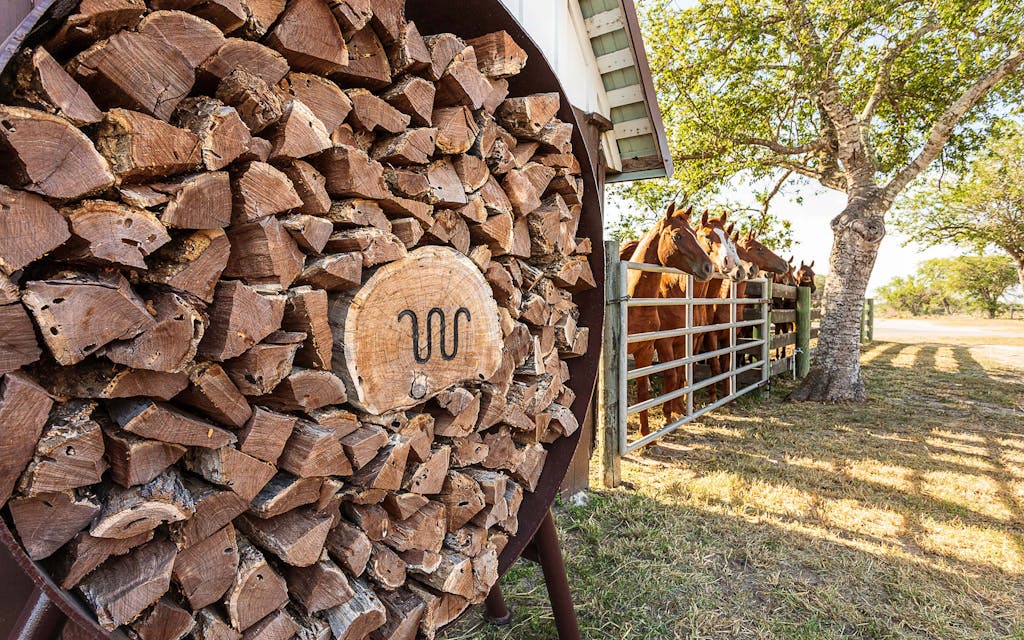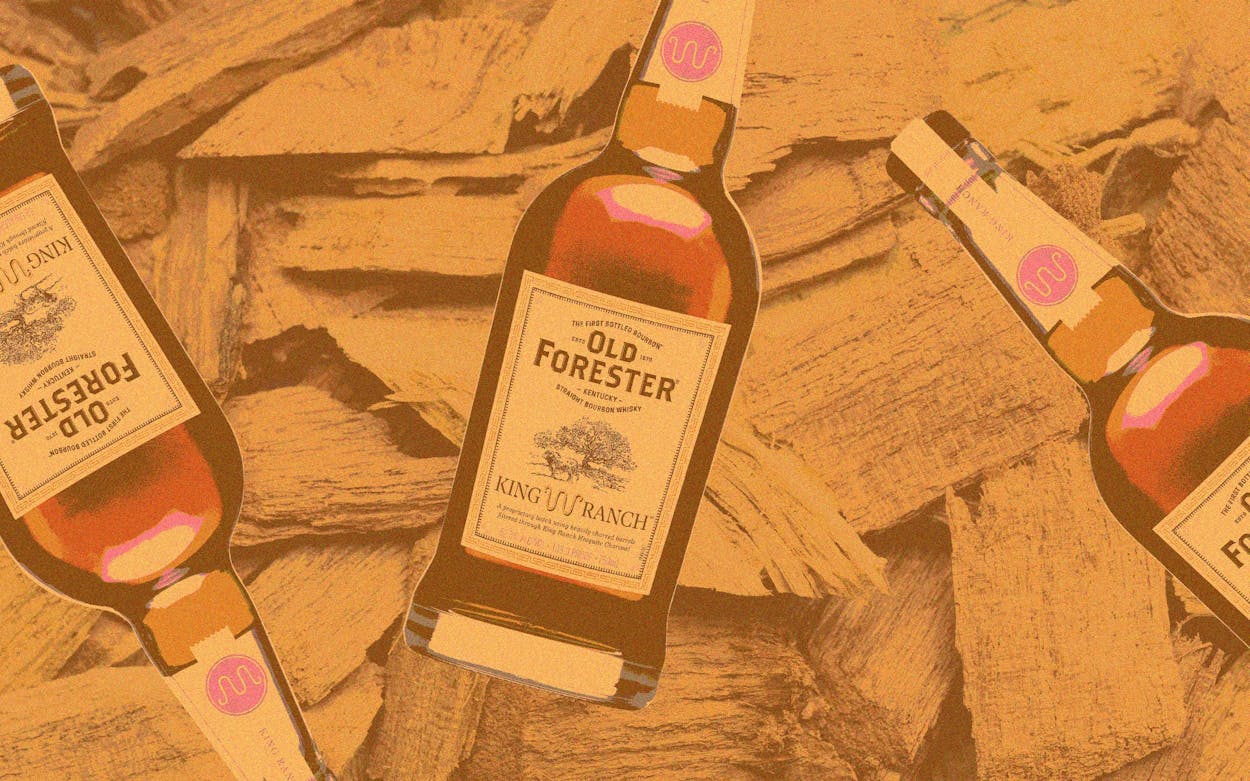Rolling through King Ranch in the back of a truck, South Texas ranch life unfolds before me. Cruising down a single-lane road, I see live oaks and palm trees pop into view and deer occasionally scamper across the path. Cranes anchor themselves by small ponds while an alligator sunbathes on a far-off creek bank. But the fauna King Ranch is most famous for are its Santa Gertrudis cattle, and the dominating flora are the mesquite thickets. While the invasive trees are great for shading cattle, they’re not so great on the landscape, as they suck up groundwater and lower the water table, killing other area vegetation in the process.
To combat its mesquite problem, King Ranch is putting the fragrant wood in bourbon. Old Forester’s King Ranch bourbon, which debuts on November 1, is made in partnership with the 152-year-old distiller based in Louisville, Kentucky. The limited-edition product will only be sold in Texas. The full-bodied bourbon features notes of toasted marshmallow, cherries, nuts, and vanilla.
Texas has had strong entries into the bourbon game in recent years with its own regional take on the spirit, which tends to be bolder and more concentrated than its counterparts. However, King Ranch decided to collaborate with Kentucky’s Old Forester because both businesses have rich histories, with seven and five generations, respectively, of family ownership. “The King Ranch has been approached through the years by various brands to create things such as seltzers, ranch waters, and so on, but nothing seemed like the right fit until we started talking with Old Forester,” says Robert Hodgen, King Ranch’s CEO. And while it’s not uncommon for King Ranch to put its name on a wide range of products, including Ford trucks, cowboy boots, and apparel, the bourbon hits a bit closer to home.
Mesquite has long been part of life in Texas. Indigenous peoples across the Southwest used the tree for many purposes, including its sap for medicine and its fibers and bark for baskets and clothing. Today, mesquite is most popularly known for the flavor it imparts to barbecue, especially across South and West Texas, but you can also eat the beans in several ways. Despite its usefulness, mesquite is a nuisance for King Ranch because it severely reduces the natural grasses and grazing land for livestock. “We always have extra mesquite, so making bourbon from it is a great way to use it,” Hodgen says.

Cole Irvin, senior scientist at Brown-Forman, the company that owns Old Forester, figured out how to turn King Ranch’s mesquite trees into charcoal used in the filtering and finishing process for the bourbon. “We came out to the King Ranch to work with the family in developing this charcoal, and we stayed with it every step of the way to make sure we created a charcoal that would work with the bourbon,” Irvin says. Mesquites aged five to seven years were cut and collected, then smoked over a slow-rolling fire for twelve to fifteen hours. The charcoal chips were shipped to Louisville to filter the bourbon, which was aged in extremely charred oak barrels before being bottled. The result is a big, bold bourbon full of spice and depth. “South Texas is very rugged, so we wanted to really mimic that rugged nature,” Hodgen says. “But you still get a super smooth bourbon that isn’t really defined by smokiness.”
In addition to bringing back vegetation for cattle, cutting down the mesquite trees helps natural quail habitats flourish. “In normally functioning grassland and grassland-woodland ecosystems, mesquites have their role to play and can and do provide habitat for avian species,” says John McLaughlin, the Upland Game Bird Program leader at Texas Parks and Wildlife. But if the density of mesquite increases, the trees begin to shade and crowd out native grasses, flowering plants and weeds, and shrubs, which reduces the amount of habitat and shelter available for quail. Grassland birds—like the northern bobwhite and the scaled quail, two of the most abundant quail species in Texas—are the fastest-declining suite of birds in the U.S. and Canada.
Quail are intolerant to excessive tree cover, as it increases the amount of “visual obstruction” they have, McLaughlin says. The more tree cover there is, the more time the birds spend keeping an eye out for danger and the less time they have for foraging and resting.
It’s a triple win: quails get their habitats back, the cattle have more room to roam and eat, and Texas tipplers get to enjoy an exclusive bourbon with a distinctly South Texas terroir.
Back at the ranch, we head to the barn emblazoned with the classic Running W brand to taste the result of all this effort. I take a sip of the bourbon, and it reminds me of something you’d drink around a winter campfire.
As I take in the label—a mesquite tree shading a Santa Gertrudis cow—I smile as I recognize that while the tree is a nuisance to many, its gifts are equally abundant, including its latest offering in a glass.
- More About:
- Libations
- King Ranch






